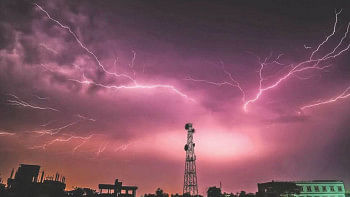'Divide capital into 15 city corporations to ensure utility services'
Speakers at a meeting yesterday stressed the need for dividing the capital city into 12 to 15 city corporations to ensure water, sanitation, gas and electricity facilities for all citizens especially for the slum dwellers who suffer most from the lack of utility services.
Since it is not possible for Dhaka City Corporation (DCC) alone to give proper attention to all areas of a mega city like Dhaka, it is important to make every ward commission more functional by providing adequate authority to mitigate its local problems, they suggested.
With the support of Resource Integration Centre (RIC) and Manusher Jonno Foundation (MJF), Nagorik Adhikar Sangrakkhan Forum (NASF) organised the meeting titled 'Integrated initiatives of citizens in establishing good governance and city management' at Women Voluntary Association (WVA) auditorium in the city.
Speaking as chief guest Prof Muzaffer Ahmad underscored the need for decentralisation of mills and factories to other districts to lessen the rush of people to Dhaka which is beset with various problems like housing, sanitation, health and environment.
"If we can decentralise the RMG industries to other districts then 50 percent of the city population would be reduced and the problems facing the city dwellers would be solved largely," he added.
Prof Muzaffer urged the government to formulate a proper policy for those who are coming to the city from outside.
He called on the NGOs to set up healthcare centres at each slum to provide medical facilities in exchange for little money as it is very difficult to get such facilities form the government.
"It is also very crucial to save our rivers and canals around the city from encroachers and harvest the rain water as an alternative to meet the prevailing pure water crisis," he added.
Speaking as special guest RIC Director Abul Hasib Khan focused on coordination among the service delivery organisations to ensure citizens' rights properly.
Alleging that the people's representatives do not visit the slum areas to see what terrible situations are prevailing there, he said, " If each lawmaker takes the problems of their respective areas seriously then it would be easy to solve them.”
He said with the support of Manusher Jonno Foundation, RIC has taken up a project to reach minimum facilities to people living at 78 slums in the city.
Presided over by NASF President Hafizur Rahman, the meeting was also addressed by Ziaul Karim, programme manager of MJF, and RICK Programme Coordinator SMA Muhit.
Around 100 people from different wards and slums in the city participated in the meeting and some of them narrated their sufferings.

 For all latest news, follow The Daily Star's Google News channel.
For all latest news, follow The Daily Star's Google News channel. 



Comments